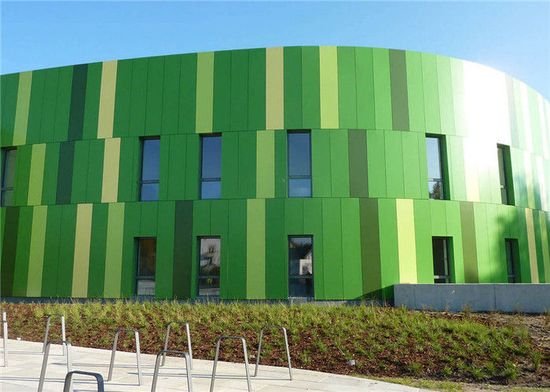
Or
By clicking Sign In, Join Free or Continue with Facebook, Linkedin, Twitter, Google, I agree to the Terms & Conditions and the Privacy Policy
Or
By clicking Sign In, Join Free or Continue with Facebook, Linkedin, Twitter, Google, I agree to the Terms & Conditions and the Privacy Policy

 November 18, 2023
November 18, 2023Building facades are becoming more than just a protective cover for the buildings. They are also the artistic and functional aspects of contemporary structures. Architects are integrating innovation and modern designs to birth spectacular statements. But what about sustainability? A study in 2021 reveals that the facade can contribute up to 30% of the building's embodied carbon footprint.
As developers move towards green building, they strive to incorporate environment-friendly materials in the construction process. Aluminium composite facades are an eco-friendly option that allows designers to make dynamic yet sustainable designs.

Aluminium composite panels, or ACPs, are a top choice for building facades because they are flexible, lightweight, versatile, and durable. Moreover, they largely contribute to the idea of green buildings.
Why do modern buildings use aluminium composite facades?
One of the primary reasons architects prefer using aluminium is because it is easy to use, and they can create unique designs with the malleable metal. In addition, aluminium composite panels are available in different colours, sizes and styles. However, there is more to it than the aesthetic value. Aluminium composite panels can help a building become energy-efficient and eco-friendly in various ways. Here are a few advantages of using ACP facades:
Despite its numerous advantages, aluminium composite facades have some drawbacks. ACP facades can be more expensive than cladding materials like dry walls or plaster. Next, although installing these facades is relatively simple, it requires some special tools and skills to work with them. If installed poorly, the facades may dent during strong winds and storms. You cannot achieve a woodsy or natural look for the exterior with ACP facades. However, it is important to note that ACP facades' mechanical, operational, and ecological benefits outweigh its disadvantages.
The future of modern building
Modern green buildings blend architectural prowess and conscious consumerism and design. As building facades become a staple, aluminium composite panels will play a vital role in achieving sustainability and energy efficiency. It is important to note that the rise in sustainability culture in the construction sector also facilitates the growth of the aluminium industry. Now, both share a symbiotic relationship. Aluminium composite facades will help a building match all the sustainability concepts like energy efficiency, carbon footprint reduction, lesser emissions, etc.
To understand the construction industry's integration of aluminium and its drive toward sustainability, delve into the e-Magazine publication by AL Circle titled "Aluminium - Revolutionizing the Construction Sector." This edition provides valuable insights into how the building and construction sector has strategically embraced aluminium, showcasing its transformative impact on the industry's practices and its pivotal role in fostering a sustainable future.